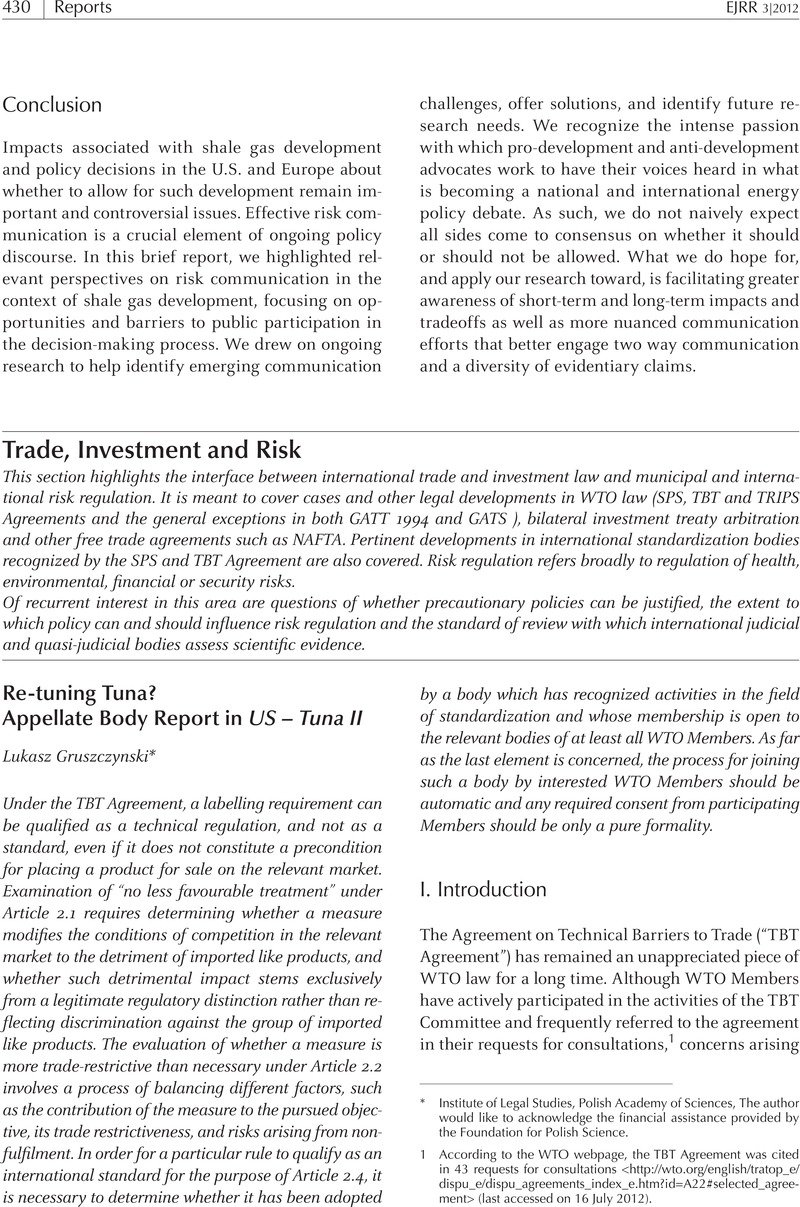No CrossRef data available.
Article contents
Re-tuning Tuna? Appellate Body Report in US – Tuna II
Published online by Cambridge University Press: 20 January 2017
Abstract

- Type
- Reports
- Information
- Copyright
- Copyright © Cambridge University Press 2012
References
1 According to the WTO webpage, the TBT Agreement was cited in 43 requests for consultations <http://wto.org/english/tratop_e/dispu_e/dispu_agreements_index_e.htm?id=A22#selected_agreement> (last accessed on 16 July 2012).
2 Appellate Body Report, European Communities – Trade Description of Sardines, WT/DS231/AB/R, adopted 23 October 2002, DSR 2002:VIII, 3359; relatively extensive analysis of the TBT provisions also appeared in Appellate Body Report, European Communities – Measures Affecting Asbestos and Asbestos-Containing Products, WT/DS135/AB/R, adopted 5 April 2001, DSR 2001:VII, 3243 and Panel Report, European Communities – Measures Affecting the Approval and Marketing of Biotech Products, WT/DS291/R, WT/DS292/R, WT/DS293/R, Add.1 to Add.9, and Corr.1, adopted 21 November 2006, DSR 2006:III-VIII, 847.
3 The two cases are: Appellate Body Report, United States – Measures Affecting the Productions and Sale of Clove Cigarettes, WT/DS406/AB/R, issued 4 April 2012, not yet adopted; and Appellate Body Report, United States – Certain Country of Origin Labelling (COOL) Requirements, WT/DS384/AB/R, WT/DS386/AB/R, issued 29 June 2012, not yet adopted.
4 Appellate Body Report, United States – Measures Concerning the Importation, Marketing and Sale of Tuna and Tuna Products, WT/DS381/AB/R, issued 16 May 2012, not yet adopted.
5 Note that smaller vessels fishing in the ETP region are relieved of these obligations. In other words, they can use the “dolphin-safe” label without complying with the detailed requirements of the DPCIA.
6 Panel Report, United States – Measures Concerning the Importation, Marketing and Sale of Tuna and Tuna Products, WT/DS381/R, issued 15 September 2011, para. 7.145.
7 Note that there was one dissenting panellist who believed that US scheme should be classified as a standard and not a technical regulation. He did not, however, question the applicability of the TBT Agreement as such. For a more detailed analysis of this aspect of the dispute, see Arcuri, Alessandra, “Back to the Future: US-Tuna II and the New Environment-Trade Debate”, 2(3) European Journal of Risk Regulation (2012), pp.177–189 CrossRefGoogle Scholar.
8 Panel Report, US – Tuna II, paras. 7.374–7.378.
9 Ibidem, paras. 7. 408–427.
10 Ibidem, para. 7.578.
11 Ibidem, para. 7.728.
12 Qualification of a measure as either technical regulation or standard changes the set of applicable TBT provisions.
13 Appellate Body Report, US – Tuna II, para. 188.
14 Ibidem, para. 194.
15 Ibidem, para. 196.
16 Ibidem, para. 215, quoting Appellate Body Report in US – Clove (para. 182).
17 The panel took a different analytical approach under Article 2.1 It asked whether the measure accorded different treatment to Mexican (imported) products as compared to US (domestic) products and whether this differential treatment was based on the origin of products. This seems to limit the examination to de jure discrimination and disregards the fact that discrimination can also be of a de facto nature.
18 Appellate Body Report, US – Tuna II, para. 297.
19 Ibidem, para. 322.
20 Ibidem, para. 330.
21 Ibidem, para. 359.
22 Ibidem, paras. 396–399. For a more elaborate discussion on the disciplines provided by Article 2.4, as interpreted by the Appellate Body and the panel, see Glinski, Carola, “Private Norms as International Standards? – Regime Collisions in Tuna-Dolphin II”, 3(4) European Journal of Risk Regulation (2012)CrossRefGoogle Scholar, forthcoming.
23 For other issues (and their criticism or appraisal), see for example the post of Joost Pauwelyn on the worldtradelaw.net blog and his discussion on the relevance of the Appellate Body's findings for the process and product methods distinction under the TBT Agreement (<http://worldtradelaw.typepad.com/ielpblog/2012/05/tuna-the-end-of-the-ppm-distinction-the-rise-of-international-standards.html#comments>, last accessed on 16 July 2012) or the post of Rob Howse (<http://worldtradelaw.typepad.com/ielpblog/2012/05/quick-thoughts-on-tuna.html>, last accessed on 16 July 2012).
24 See Appellate Body Report, US – Clove Cigarettes, fn 372 (rejecting the proposition that under Article III:4 of the GATT 1994, panels should inquire whether “the detrimental effect is unrelated to the foreign origin of the product”).
25 See e.g., Panel Report, United States – Certain Measures Affecting Imports of Poultry from China, WT/DS392/R, adopted on 29 September 2010, para. 7.136. Although the panel recognized the relevance of the decisions of the SPS Committee it failed to identify Article 31 of the VCLT as the relevant basis for such a conclusion.
26 See Gardiner, Richard, Treaty Interpretation (Oxford: Oxford University Press, 2008), pp.220–21Google Scholar.
27 The analysis of the panel in US – Clove Cigarettes was also limited. In the EC – Sardines case the panel, exercising judicial economy with regard to claims under Article 2.2, refrained from making findings under this Article.
28 Appellate Body, US – Tuna II, para. 314.
29 Ibidem, paras.315–317.
30 Ibidem, para. 321.




